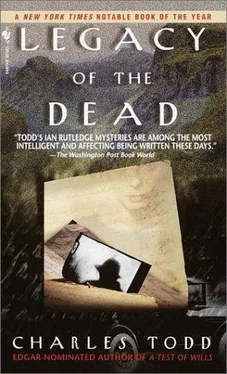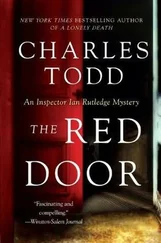Charles Todd - Legacy of the Dead
Здесь есть возможность читать онлайн «Charles Todd - Legacy of the Dead» весь текст электронной книги совершенно бесплатно (целиком полную версию без сокращений). В некоторых случаях можно слушать аудио, скачать через торрент в формате fb2 и присутствует краткое содержание. Жанр: Полицейский детектив, на английском языке. Описание произведения, (предисловие) а так же отзывы посетителей доступны на портале библиотеки ЛибКат.
- Название:Legacy of the Dead
- Автор:
- Жанр:
- Год:неизвестен
- ISBN:нет данных
- Рейтинг книги:5 / 5. Голосов: 1
-
Избранное:Добавить в избранное
- Отзывы:
-
Ваша оценка:
- 100
- 1
- 2
- 3
- 4
- 5
Legacy of the Dead: краткое содержание, описание и аннотация
Предлагаем к чтению аннотацию, описание, краткое содержание или предисловие (зависит от того, что написал сам автор книги «Legacy of the Dead»). Если вы не нашли необходимую информацию о книге — напишите в комментариях, мы постараемся отыскать её.
Legacy of the Dead — читать онлайн бесплатно полную книгу (весь текст) целиком
Ниже представлен текст книги, разбитый по страницам. Система сохранения места последней прочитанной страницы, позволяет с удобством читать онлайн бесплатно книгу «Legacy of the Dead», без необходимости каждый раз заново искать на чём Вы остановились. Поставьте закладку, и сможете в любой момент перейти на страницу, на которой закончили чтение.
Интервал:
Закладка:
He couldn’t see her face clearly, but he instantly recognized her. And the grief in her eyes shamed him, cutting through his defenses.
Terrified, he tried to turn away, and couldn’t. His feet were rooted to the spot, his body paralyzed by her eyes.
She was coming toward him now, up the church walk. She was saying something to him, then she pointed to the side of the churchyard and the grave there. Only there wasn’t a body lying beneath the bare brown earth. He knew that at once.
There were tears on her face, but no hatred. He thought he could have borne the hatred, but not the pity in her eyes.
He began to walk toward her, not of his own volition but of hers, drawn to her, drawn to the drift of flowers she held, drawn to the grave they were destined for. She had brought enough flowers for the two of them to spread over the earth, to cover its ugliness. He could see it now, raw, without beauty or grace or the mercy of time, and he couldn’t face it-one more step and he would read the name on the stone, and that would be intolerable Ian Rutledge woke with a start, breathing harshly from shock.
He was sitting upright, knees raised, head flung back, drenched with sweat and with horror, terrified of the heavy, suffocating blackness that surrounded him, that made him blind.
Frantic, he put his hands to his face to claw the viscous mask away and touched-not the thick mud of the trenches but his own flesh.
Surprised, confused, he tried to think. If he wasn’t in France, where was he? His hands floundered, found sheets-a pillow. The clinic?
As his eyes grew accustomed to the impenetrable darkness, he was able to pick out the ghostly shape of his surroundings. A door-a mirror-a bedpost Rutledge swore. I’ve been asleep-I’m in my bed – I was dreaming -
But it was several minutes before the vivid dream faded enough for him to shake off the overwhelming sense of doom it had left behind. In the back of his mind he could feel Hamish rumbling like heavy thunder-or the guns- trying to tell him something he didn’t want to hear-over and over again.
Fumbling for a match, he lit the candle on the table by his bed, then got up and switched on the light. It blared down at him from the high ceiling, garish and stark after the darkness, but he was grateful for the reality it provided, pushing back the last remnants of sleep and of his nightmare.
He pinched out the candle flame, looked at the watch lying beside the brass candlestick, and saw that the time was close to three o’clock. In France he’d often slept with a stub of candle clenched in his hand. Unlit-it would have been madness to light it-but a symbol of light all the same. He still kept one beside his bed, a talisman.
This was London, not the trenches, and there was no mud – He repeated the words, listening to their sanity.
Around him were his own belongings: the carved armoire by the door to the sitting room, the mirror where he put on his tie every morning, the chair that had been his father’s, the tall posts of the bed he had slept in as a boy, the dark burgundy draperies his sister had helped him hang. All of them familiar, and in their own way, unexpectedly comforting. They had been his before the war, just as this flat had been, and returning here had been a bulwark against the intervening hell of the trenches. A promise that one day he would be the same man again.
I’ve been working too hard, he thought, moving between the bed and the tall chest and coming to a halt by the table set beneath the window. He pushed aside the draperies. Outside, rain clouds were hanging heavily over the city. Gray and depressing. He turned away, letting the heavy fabric fall again. Frances is right, I need rest. It will stop when I can rest.
His sister Frances had put it in no uncertain terms. “You look terrible, Ian! Tired and thin and still very unlike yourself. Tell Old Bowels to give you leave, you’ve worked as hard as ten men since you came back to the Yard, and the doctors told you quite clearly-”
Yes, they’d told him. But in work was-sometimes-forgetfulness.
Hamish, tireless at the back of Rutledge’s mind, said, “It’s no’ true, you canna’ forget. There’s only emptiness, sometimes.”
“I’ll settle for that. When I’m weary enough to sleep, there’s peace- was peace,” Rutledge corrected himself. From long habit he answered the voice only he could hear, the voice of a dead man. It was as clear as his own in the silent room, with a Highlander’s soft accent, and so real it seemed to come from just behind him. As if the speaker might be standing there if Rutledge turned his head. But there was no one behind him-although the dread of being wrong about that was nearly as real as the voice.
He tried to shove the dream back into the far reaches of despair, refusing to remember any shred of it, refusing to believe any part of it. Then realized that he was standing in the middle of the floor, frowning, remembering.
He shook himself and went back to the window to look out again. Hamish said behind him, “It’s no’ so gloomy in the Highlands-the rain’s clean, sweet.”
Rutledge, grateful for the distraction, nodded.
What we call shell shock for lack of a better term, said the doctor at the clinic-Frances’s friend, the one who’d brought him back from the edge of insanity-is not fully understood. “I can’t tell you how it will progress. Whether one day you’ll find it gone-or whether it will stay with you for the rest of your life. Whether it will get a little better with time or a good deal worse. We don’t know, you see. A few of the men like you I’ve treated have managed to find a way to live with it. You must do the same. Don’t worry yourself about the medical aspects of it, just get on with your life and make the best of the fact that you can reason and think and act quite normally.”
Rutledge was no longer certain what “normal” was. He hadn’t been since early 1916.
His war had not ended in triumph and rejoicing.
By the time guns stopped firing in 1918 at the eleventh hour of the eleventh day, he’d been locked in such desolation that he hardly knew where he was.
A month later he’d been found dazed and incoherent, wandering the roads of northern France. Wearing a German greatcoat, unable to give his name or even his nationality, he’d eventually been sent back to the British command: a major in the French army had recognized him as a liaison officer he’d met in 1915.
The British had promptly clapped him in hospital. Shell shock, the diagnosis was. Outlook: uncertain.
And it had been. Nothing had brought him out of the bleak and accusing silence in which he’d been found. He had begun to remember who and what he was-Ian Rutledge, British officer, former Inspector at Scotland Yard. He had recognized his sister Frances, and been allowed, briefly, a meeting with his fiancee.
It had not been a success. When he reached numbly for Jean’s hand, she’d snatched it away. She had been carefully coached by the doctors, but her eyes had been filled with fright as she made inane conversation in a trembling voice. He’d seen her only a few times after that, before she’d broken off their engagement.
It had been his sister who had got him out of the hellhole that was a hospital for shell-shock victims and into a private clinic.
And the doctor there, Fleming by name, had mercilessly broken him.
Rutledge had fought him every step of the way. But bone-weary and ill, he’d been no match for the tall, raw-boned doctor who had seen in the shambles a man worth saving and so refused to admit defeat.
The truth about Corporal Hamish MacLeod had come out, raggedly at first and then relived so vividly that Rutledge had believed he was in the trenches again.
Afterward, Rutledge had nearly killed Fleming, a last desperate defense of an inner self so unacceptable to a conscious mind that he’d hated the doctor, blamed him for bringing him out of his silence and back into awareness…
Читать дальшеИнтервал:
Закладка:
Похожие книги на «Legacy of the Dead»
Представляем Вашему вниманию похожие книги на «Legacy of the Dead» списком для выбора. Мы отобрали схожую по названию и смыслу литературу в надежде предоставить читателям больше вариантов отыскать новые, интересные, ещё непрочитанные произведения.
Обсуждение, отзывы о книге «Legacy of the Dead» и просто собственные мнения читателей. Оставьте ваши комментарии, напишите, что Вы думаете о произведении, его смысле или главных героях. Укажите что конкретно понравилось, а что нет, и почему Вы так считаете.












